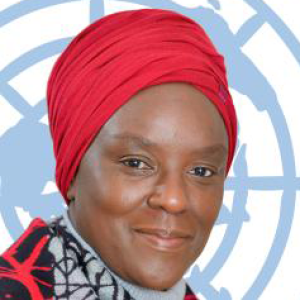Women Parliamentarians Meeting- 16 Days of Activism Against Gender Based Violence
Speech by the UN Resident Coordinator
Allow me to pay my respect to:
HIS MAJESTY KING LETSIE III;
THE RIGHT HONOURABLE THE PRIME MINISTER;
HONOURABLE PRESIDENT OF THE SENATE;
HONOURABLE SPEAKER OF THE NATIONAL ASSEMBLY;
HIS LORDSHIP THE CHIEF JUSTICE
HONOURABLE DEPUTY PRIME MINISTER;
HONORABLE MEMBERS OF PARLIAMENT;
HONOURABLE MEMBERS OF HIS MAJESTY’S GOVERNMENT;
THEIR LORDSHIPS JUDGES OF THE COURT OF APPEAL AND THE HIGH COURT;
THE INTERNATIONAL COMMUNITY AND DEVELOPMENT PARTNERS
DISTINGUISHED GUESTS , LADIES AND GENTLEMEN,
ALL PROTOCOL OBSERVED
Good Morning, and thank you for inviting me to join you on this important occasion, as we commemorate the 16 days of activism against gender-based violence. I would like to congratulate you all for being voted in as parliamentarians. It is an incredibly important achievement. The trust that has been placed in you and the expectations of communities up and down the country are huge.
The conversation on violence on the bodies of women and girls is not new in Lesotho. Last week when the 16 Days were launched, I shared some disturbing global statistics from UN Women that more than 1 in 3 women experience gender-based violence during their lifetime. In 2021, nearly 1 in 5 women aged 20-24 were married before turning 18. A new study by UNODC and UN Women shows that, on average, more than five women or girls were killed every hour by someone in their own family in 2021.
How many women in Lesotho have been killed in the past year alone due to Gender-Based Violence? How many have been sexually assaulted? How many in our communities are victims of child marriage?
These are difficult questions and the responses are heartbreaking. We all know and agree that the experiences of women and girls in our society need to change.
On Friday the 25th November we heard from a 16-year-old girl whose father had raped. She got pregnant as a result and now has a baby. She talked about her pain and her need to go back to school to get an education. She warned her fellow young people to be aware that parents do this to them. She raised the fact that young people need to be protected and nurtured. She talked of a better future for her own child. She wants a different experience for herself and for her child.
Here is where you, bo ‘me’ come in. You hold the power to make a difference to this girls life and the lives of many other young girls and women.
The functions of Parliamentarians across the world is very similar. You have been entrusted with the ability and power to make laws, to amend legislation that does not deliver, to allocate national funds and to have oversight on the use of said funds. As parliamentarians, you also have the space to debate the important issues of the day and influence the course of decision making and therefore the trajectory of development in the country.
I would like to ask some questions to all of us in here as policymakers, legislators and leaders:
If you had the opportunity to make changes that would mean that the experience of this young girl and many like her could be prevented?
- Would you speak out in your constituency and in parliament for all to know that you stood for women and girls rights?
- Would you lift your voice in defense of allocating funds for the 16-year-old girl to go back to school and be provided with support and many others who have had a similar experience
- Would you champion and support the Counter Domestic violence Bill, The Amendment of the Legal Capacity Act to include widowed women married under customary law, the amendment of the Children’s Protection and Welfare Act and other amendments that will not only improve the lives of women but the lives of Basotho in general.
- Would you try to understand the resources allocated to combat gender-based violence in the different ministries?
- When time comes to exercise your oversight role, would you request to understand what has been achieved by government?
- Would you request for the data and statistics on violence against women and girls to be better informed on the real situation
- Would you regularly talk to the women and girls in your constituencies to understand their lived realities and that for them home is not a safe place to be
- As the person who has power to make a difference in their lives, would you take every opportunity to ensure that you stood for the women and girls who placed their hopes and dreams of a better Lesotho in you?
If anyone can win this battle, it is the women of this country, not just for themselves but also for their children. And women parliamentarians have the power to lead this battle. This fight against gender-based violence and the pursuit of gender equality must be taken to every committee, every decision-making space, every debate, every village, every community, every constituency, every workplace and every home.
BASALI KE TAOANA LI MESANA (women are strong, bold to protect what is worth for them like a Lioness who would stand any danger to protect her set of Cubs – all these in a dress).
The United Nations will continue to support and engage with parliament in its various portfolio committees on national issues but with this group, will particularly focus on issues that affect women, because to care for women, is to care for a nation.
We will continue to advocate for a whole-of-society approach to tackling gender-based violence. We stand ready to accompany you, the government, and the people of Lesotho.
Kea leboha!
Speech by




